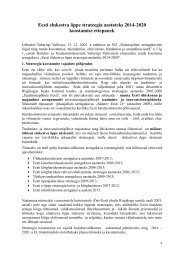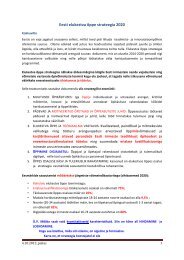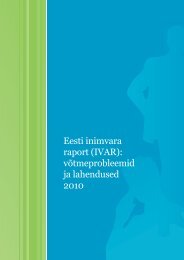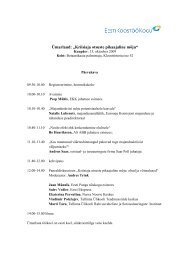Estonian Human Development Report
Estonian Human Development Report - Eesti Koostöö Kogu
Estonian Human Development Report - Eesti Koostöö Kogu
You also want an ePaper? Increase the reach of your titles
YUMPU automatically turns print PDFs into web optimized ePapers that Google loves.
6.3. Relationships between<br />
economic and social policy<br />
The three whales of economic policy<br />
We will start this subchapter by introducing some principles<br />
of economic policy, by describing the importance<br />
of the institutions that link and direct participants in the<br />
economy. We will continue with social policies, thereafter<br />
we will present a matrix of governance correlations,<br />
and end with some conclusions about Estonia. In this<br />
case, we are dealing with social policy in the broader<br />
sense, which includes the entire social sphere. In this<br />
approach, education and health care are added to social<br />
protection and security. Materials from the Commission<br />
on Growth and <strong>Development</strong>, which was formed<br />
under the auspices of the World Bank, have been used<br />
as background for the following text, which includes a<br />
rather broad attempt to encompass growth and development<br />
correlations and influence factors (The Growth<br />
<strong>Report</strong>, 2008).<br />
The first and most important starting point for economic<br />
policy is the fact that the economy is based on<br />
market mechanisms that are guided by price signals,<br />
decentralized decision-making, and the preferences of<br />
consumers directed from the demand side to the supply<br />
side. The functioning of markets is framed by the property<br />
rights, which guarantee companies and entrepreneurs<br />
asset rights that are sufficient for making investments<br />
to increase the assets and use them in the best<br />
way.<br />
This is the general starting point for the shaping of<br />
economic policy that needs to be supplemented and regulated.<br />
The general reasoning for the latter is that economic<br />
activity itself may not suffice for the creation of the information<br />
necessary for realizing property rights or for the<br />
functioning of the markets. Therefore, the need develops<br />
for economic and other policies.<br />
Another prerequisite is related to the fact that the<br />
economic activities of all countries are more or less<br />
internationally open. Besides everything else, this also<br />
means that most knowledge and skills, including technological<br />
ones, are usually learned from others rather<br />
than being the result of invention. The widespread<br />
transfer of knowledge and technology from other countries<br />
has occurred in all countries with rapid and longterm<br />
economic growth. Moreover, knowledge includes<br />
both abstract formulas and practical applications, such<br />
as skills necessary for traffic management or for the<br />
construction of multi-level intersections. Moreover, the<br />
social organization side is at least as important as technical<br />
solutions.<br />
The third general condition is macroeconomic stability,<br />
the internal aspect of which is related to price<br />
stability and the external aspect to the stabilization of<br />
exchange rates, currency convertibility, balance of payments<br />
and currency reserves. The most universal consideration<br />
of stabilization is related to the uncertainty and<br />
risk of the economic environment. High inflation rates,<br />
as well as disturbances in the cash and capital flows<br />
related to other countries reduce the reliability of market<br />
signals, which has a critical impact on long-term investment<br />
decisions. The stabilization aspect and its impact<br />
on economic activity are often expressed as a restriction<br />
on social costs. The requirements for a balanced budget,<br />
or for a limited deficit (e.g. the 3% of GDP limitation,<br />
which is a condition for acceding to the European Monetary<br />
Union), are often a significant restriction on social<br />
costs, especially in the case of costs financed from the<br />
budget.<br />
Rules and economic policy<br />
During the past few years, theories on economic growth<br />
have placed great importance on the impact of institutions<br />
directing the functioning of markets. In economics,<br />
Douglas North’s approach, according to which institutions<br />
comprise formal rules (laws and other regulations),<br />
informal rules, (standards and practices), and enforcement<br />
mechanisms for rules (e.g. courts in the case of<br />
laws, public condemnation and alienation in the case of<br />
the non-fulfilment of informal rules) is widely accepted.<br />
The immaturity of institutions, e.g. the improper observance<br />
of good business practices, is the mark of an immature<br />
society.<br />
The insufficient performance of institutions manifests<br />
a negative impact on economic growth. A weakness of<br />
regulations, practices and their enforcement mechanisms<br />
increases uncertainty, which is expressed, for instance,<br />
by insufficient protection for investments or intellectual<br />
property, uncertainty about the impartiality of economic<br />
policy decisions, and an assumption of corruption<br />
in order to gain access to the infrastructure, real estate,<br />
and state procurements of the given country. The ratio of<br />
the black market in the country’s economy and the ability<br />
of the country’s institutions to curb this black market are<br />
also important.<br />
However, institutions are not absolute or definite,<br />
but rather develop along with economic conditions. For<br />
instance, accounting precision improves as the credit<br />
market develops. Institutional development is related to<br />
human and social capital, their performance assumes<br />
an accumulation of knowledge, learning and adaptation<br />
to economic needs. The performance of institutions is<br />
directly impacted by social capital, the strength and operation<br />
of connections between people.<br />
<strong>Human</strong> capital and social capital and<br />
the policies impacting them<br />
To form the factors related to the social side and assess<br />
their impact on economic activities and well-being, we<br />
used the concepts of human and social capital. <strong>Human</strong><br />
capital is defined as the education, health and skills of a<br />
country or some other body of humans. The definition of<br />
social capital includes formal and informal networks, general<br />
confidence, specific confidence in institutions and the<br />
impact of standards.<br />
These concepts expand a strictly economic treatment<br />
of capital, by highlighting the impact of social factors on<br />
131 |















